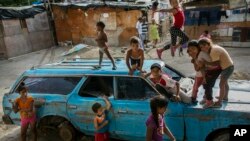The U.N. children's agency, UNICEF, said Friday that it is scaling up its response in crisis-stricken Venezuela, where 3.2 million children are in need of assistance.
"We have opened offices in the border with Colombia and in the border with Brazil," Paloma Escudero, UNICEF's director of communication, told VOA. "We are increasing our presence in greater Caracas and our objective in the coming months is to reach every child in need around the country."
UNICEF, which has had a presence in Venezuela for decades, has in the last year expanded its work there, delivering more than 200 tons of health, nutrition, water and sanitation supplies.
Escudero just wrapped up a three-day mission to the country, where she met with families, health care workers and humanitarians and assessed the growing level of need.
"I talked to many children who said how they admired their mothers, because it's a real struggle to put three meals a day on the table," Escudero said. The UNICEF official also said she met many mothers and grandmothers who receive just $8 a month to cover their family's basic needs.
Fuel shortages are having an impact on food access for some families, while the scarcity of spare parts is preventing some ambulances from running.
Certain diseases are also on the rise, including diphtheria and measles. UNICEF is about to launch a massive polio vaccination campaign.
All of this costs money and currently, UNICEF needs $32 million to keep these programs going this year, but they say they will be revising that figure upward to cover growing needs.
Refugee crisis
Escudero said migration is for many Venezuelan families an option of "last resort."
But as the crisis continues to escalate, the U.N. refugee agency announced Friday that more than 4 million people have fled Venezuela since 2015.
Venezuelans are now one of the largest single displaced population groups in the world. Since November, the number of refugees and migrants has increased by one million persons.
Most remain in Latin America, but the huge numbers of displaced are stretching thin resources in host countries. Neighboring Colombia has some 1.3 million Venezuelans, while Peru has 768,000. Chile, Ecuador, Brazil, Argentina and Mexico have also taken in large numbers of Venezuelans.
U.N. refugee agency special envoy Angelina Jolie traveled Friday to Colombia's border areas with Venezuela to see the challenges facing host countries. She will meet with Colombian government officials and local organizations assisting with the humanitarian response during her two-day visit.
The political crisis choking the country began in May 2018, after a disputed presidential election in which incumbent President Nicolas Maduro won a second six-year term. He was sworn in on Jan. 10. On Jan. 23, the democratically-elected National Assembly — which is controlled by the opposition — declared Maduro's rule illegitimate. Invoking constitutional provisions, National Assembly leader Juan Guaido declared himself interim president until there are new elections.
Regional and international stakeholders have been trying to mediate a peaceful resolution to the crisis.





